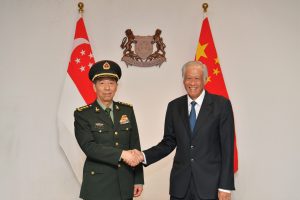China and Singapore yesterday announced that they would work toward the establishment of a high-level defense communications hotline, amid the growing strategic competition between Beijing and Washington.
Chinese Defense Minister Gen. Li Shangfu and his Singaporean counterpart Ng Eng Hen signed a memorandum of understanding to work toward establishing a secure telephone link “for high-level communications between our defense leaders,” Singapore’s government said in a statement, according to The Associated Press.
“Such high-level open lines of communication are important for strengthening mutual understanding and trust,” the statement said. Li was in the city-state ahead of this weekend’s Shangri-La Dialogue Asian security summit, when U.S.-China tensions are likely to receive a thorough airing.
The two sides did not announce a timeline for the establishment of the hotline. But the creation of a high-level communications link between the Chinese government and perhaps the United States’ most reliable partner in Southeast Asia is a clearly welcome development at a time of growing mutual hostility between Washington and Beijing.
During the Cold War, reliable and mutually trusted communication channels helped to stabilize the relationship between the U.S. and the Soviet Union and defuse potential conflicts.
While such a hotline was established between Washington and Beijing in late 2007, its use has not been institutionalized. In 2021, Kurt Campbell, the Biden administration’s policy coordinator for the Indo-Pacific, said that China had been reluctant to use the hotline. “The couple of times we’ve used it, just rung in an empty room for hours upon hours,” he said. When the U.S. attempted to use the hotline to contact Beijing ahead of “balloon-gate” in March of this year, China’s then Defense Minister Gen. Wei Fenghe refused to take the call, because the U.S. had “failed to create a proper atmosphere” for a bilateral dialogue.
The announcement follows the establishment of a defense hotline between China and Japan in March. It also comes at a time when U.S.-China relations are in a fragile state, with recent hopes for a rapprochement fading due to the Chinese balloon incident, growing frictions over Taiwan, and U.S. sanctions on China. Indeed, there have been no direct communications between top Chinese and American military officials for months, despite President Joe Biden’s recent claim that the Sino-American relationship would begin improving “very shortly.”
This week, Li declined a request for a meeting from his U.S. counterpart, Defense Secretary Lloyd Austin, on the sidelines of the Shangri-La Dialogue. The Chinese government says that Li will not accept a meeting unless the U.S. lifts the sanctions that it imposed on him in 2018, a request that the U.S. refused. Earlier this week, Chinese Defense Ministry spokesperson Tan Kefei said that Austin’s offer of talks in Singapore had been rejected because the U.S. “disregards China’s concerns and creates artificial obstacles.”
“The U.S. side should take practical actions to show sincerity and correct mistakes, so as to create the necessary conditions and proper atmosphere for communication and exchange between the two sides,” he said. Austin said that Li’s decision was “unfortunate” and he would “welcome any opportunity to engage” with the Chinese leadership.
The pending establishment of a Singapore-China hotline also speaks to the city-state’s deft efforts to balance its close relationships with both contending superpowers. In late April and early May, the two nations held joint military exercises on both land and sea. The drill will be the first since China and Singapore held a combined naval exercise in the South China Sea in September 2021, a move that Chinese state media said “boosted the two navies’ mutual trust and enhanced the level of military cooperation between both countries.”
In its statement yesterday, Singapore said that both countries’ defense establishments “interact regularly through bilateral and multilateral exercises.” It added that Li’s visit underscored the “long-standing, warm, and friendly” relations between China and Singapore.

































